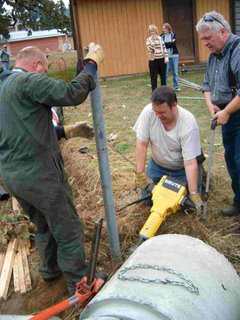A few years ago, a fellow said something like this to me: "A church is only as fundamental as its pastor." As it turned out, that pastor wasn't all that fundamental and disgraced himself and the Lord. But he was right in his observation.
Fundamentalism, evangelicalism, neo-orthodoxy, liberalism, or any shade of meaning in between is forged in the church by the leaders of the church. At the local church level, a church tends to follow the lead of its pastor. Whatever that pastor is, that church will be.
There are some occasional skirmishes that may seem to belie this principle. Churches will be embroiled in a controversy, parties form, acrimony ensues, sometimes even leading to a church split. You might be tempted to analyse these controversies to see if the people opposed to the pastor are really more theologically conservative than the pastor, but on almost every occasion you will find the controversies are much less sharply defined than that. If the split is over issues affecting fundamentalist philosophy, likely it is one or two men (often deacons) who lead the charge and become in effect de facto pastors of the dissenting group, at least for the time being.
In the ongoing (and interminable) discussions in the blogosphere regarding separation and fundamentalism, much has been made of 'what if' scenarios attempting to define a template for separation. "What if church X believes this and church Y does this, what should church Z do?" The fact is, the churches won't do anything. A pastor who believes something will decide whether he is comfortable promoting a young people's activity or a special speaker in another church based on his own philosophy of ministry. Generally speaking, his flock will follow his lead. (Quite often, they won't know what is going on at the other church because they are full of the life of their own church -- if it isn't promoted by their pastor, they won't bother, largely because they won't know.)
When it comes to the wider world of conferences and meetings, the local pastor has less control over what his folks know simply because of modern technology. But the pastor (and the other leaders of 'his' group) will still tend to promote those organizations and activities that they think are in keeping with their own philosophy and are most suited to the spiritual needs of his flock. Thus, wider friendships and alliances are formed with leaders who tend to coalesce around similar ideas.
To illustrate, in my own ministry, I tend to move in the FBF circles. I am comfortable with the direction the most prominent men in the FBF are taking, I get a bulk subscription to Frontline for our church, I promote the regional FBF meeting, I promote a family camp sponsored by a like-minded pastor, I bring in speakers who would tend to travel in FBF circles and I preach a message that would likely be acceptable in most churches pastored by FBF men. What kind of flavor does that put on our church? (I'll give you three guesses...)
Suppose I got hit by a bus, and someone with a different philosophy shows up to take over. They stop the Frontline, start promoting other magazines, other meetings, other speakers. What happens to the church? It starts moving into another orbit. This does take time, and if handled poorly, can cause the tensions that lead to a church split. With effective leadership, the direction of a church can be changed so that it becomes something entirely other than previous leadership envisioned. It is leadership that sets the agenda. The church is only as fundamental as its pastor.
Young preachers do need to sort out where they are on the theological spectrum. Their associations will determine the direction they take and the philosophy of the churches they will pastor. They should ask questions, but they shouldn't assume that there is a cut and dried template that will answer all questions about association and separation. They will determine their own philosophy. Hopefully the young fellows coming up will choose well, making astute observations of history, avoiding past mistakes and forging forward faithfully for Christ.
Regards,
Don Johnson
Jer 33.3
 I meant to add more pictures to that last post, but got confused at what blogger was doing. This one is a view of the back yard where we were fighting brush on the fence. The new fence and townhouses are in the back view. One of our guys, Edouard, from Russia, is working away on the brush.
I meant to add more pictures to that last post, but got confused at what blogger was doing. This one is a view of the back yard where we were fighting brush on the fence. The new fence and townhouses are in the back view. One of our guys, Edouard, from Russia, is working away on the brush. This picture is at the end of the day, looking out from the parking lot to the road, with my trusty truck in the foreground. There used to be a fence there by the big fir tree (another object destined for destruction).
This picture is at the end of the day, looking out from the parking lot to the road, with my trusty truck in the foreground. There used to be a fence there by the big fir tree (another object destined for destruction).
